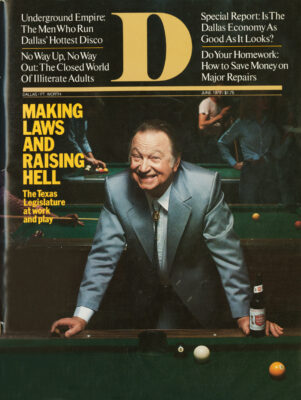In the banking business today, anybody who slows down is going to have footprints on his backside. According to the Dallas Chamber of Commerce, bank deposits in Dallas County increased last year by more than $2 billion. The big three – Republic, First National, and Mercantile (see page 100) – swallowed up more than 72 percent of this feast; the county’s hundred other banks fought over the bones. Even the invaders from Houston, giants in their own right, had trouble making inroads. First City’s downtown Dallas bank (formerly Texas Bank and Trust) increased its deposits by a paltry three percent. Texas Commerce, experiencing varying degrees of success at its eight local banks, wound up the year with a total of only 1.7 percent of Dallas County deposits.
Houston’s Texas Commerce, however, intends to increase the capital of its downtown Dallas bank and launch an all-out attack on the big three. While they’re at it, they’d better leave someone behind to watch Houston. Last year, Dallas’ First International Banc-shares gobbled up First State Bank and Trust Company of Houston, which has $82 million in deposits. The Federal Reserve Board is considering First International’s proposed acquisition of two other Houston area banks, with combined deposits of $168 million. If approved, First International will have 6.1 percent of the Houston market. Dallas’ Republic of Texas controls Houston National, that city’s fourth largest bank; Mercantile Texas owns Capital National, Houston’s seventh largest.
First International Bancshares, Republic of Texas, and Mercantile Texas are Dallas-based holding companies anchored respectively by the First National, Republic, and Mercantile banks. Though branch banking is illegal in Texas, the holding-company mechanism enables Texas’ banks to achieve many of the same purposes. The holding companies see plenty of choice acquisitions ahead; according to Gene Bishop, chairman of Mercantile Texas, there are well over 100 unaffiliated banks in Texas with assets of $50 million or more each. But Bishop says that because the stock prices of the major holding companies (when viewed as multiples of earnings) are depressed compared to those of individual banks, the plums are far from cheap.
As if the Dallas vs. Dallas and Dallas vs. Houston competition were not enough to keep bankers from sitting with their backs to the door, Bishop sees the conflict reaching national, even global proportions. Banks from other states are setting up loan production offices in Texas; major foreign banks are making significant acquisitions in the U.S. And competition between banks and savings and loan associations continues to accelerate. A recent ruling by the Federal Reserve Board removed the .25-percent differential that S&L’s were permitted to pay over Treasury Bill and bank rates on the extremely popular six-month money market certificates. This puts the S&L’s in an awkward position. If they fail to compete successfully, that’s bad. If they succeed, they’re likely to hear cries of “We told you so” from the banking community, demanding an across-the-board removal of the quarter-percent pad.
The local bank holding companies can’t raise much of a howl over the anticipated foreign invasion, since they’re out selling loans from Bombay to Liverpool. The Iranian situation has somewhat dampened enthusiasm for international business, however. In fact, the current appeal of Texas bank holding company stocks among securities analysts is based to some extent on the fact that they do not have the international exposure New York banks do. At First City Bancorporation’s latest annual meeting of stockholders, president Nat Rogers boasted that First City hadn’t lent a penny in Iran. First International’s annual report, in discussing $17 million worth of outstanding loans in Iran, contained this masterpiece of understatement: “While nothing has come to our attention which would indicate other than the proper satisfaction of these loans, the situation in Iran has been a changing one.”
Get our weekly recap
Brings new meaning to the phrase Sunday Funday. No spam, ever.
Related Articles

Arts & Entertainment
Finding The Church: New Documentary Dives Into the Longstanding Lizard Lounge Goth Night
The Church is more than a weekly event, it is a gathering place that attracts attendees from across the globe. A new documentary, premiering this week at DIFF, makes its case.
By Danny Gallagher

Football
The Cowboys Picked a Good Time to Get Back to Shrewd Moves
Day 1 of the NFL Draft contained three decisions that push Dallas forward for the first time all offseason.


